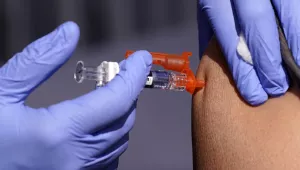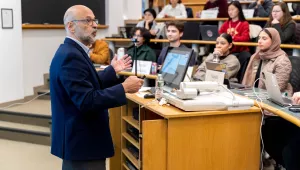For this session, the Applied History Working Group is delighted to welcome its Co-Chair Niall Ferguson, the Milbank Family Senior Fellow at Stanford University's Hoover Institution. Ferguson, in conversation with Graham T. Allison, will discuss his acclaimed new volume Doom: The Politics of Catastrophe, a sweeping reflection on lessons learned from past successes—and failures—in crisis management. This project was born during the early weeks of the pandemic, and offers an illuminating vision for a post-COVID world.
All HKS affiliates are welcome to attend; register using the RSVP link above.
Niall Ferguson is one of the world’s most renowned historians. He is the author of sixteen books, including Civilization, The Great Degeneration, Kissinger, 1923–1968: The Idealist, and The Ascent of Money. He is the Milbank Family Senior Fellow at the Hoover Institution, Stanford University, and the managing director of Greenmantle LLC. He is also a regular Bloomberg Opinion columnist. His many prizes include the International Emmy for Best Documentary (2009), the Benjamin Franklin Award for Public Service (2010), and the Council on Foreign Relations Arthur Ross Book Award (2016). His newest book, Doom: The Politics of Catastrophe, was published by Penguin Press in May 2021.
Penguin Press on Doom: The Politics of Catastrophe:
"All disasters are in some sense man-made."
Setting the annus horribilis of 2020 in historical perspective, Niall Ferguson explains why we are getting worse, not better, at handling disasters.
Disasters are inherently hard to predict. Pandemics, like earthquakes, wildfires, financial crises, and wars, are not normally distributed; there is no cycle of history to help us anticipate the next catastrophe. But when disaster strikes, we ought to be better prepared than the Romans were when Vesuvius erupted, or medieval Italians when the Black Death struck. We have science on our side, after all.
Yet in 2020 the responses of many developed countries, including the United States, to a new virus from China were badly bungled. Why? Why did only a few Asian countries learn the right lessons from SARS and MERS? While populist leaders certainly performed poorly in the face of the COVID-19 pandemic, Niall Ferguson argues that more profound pathologies were at work–pathologies already visible in our responses to earlier disasters.
In books going back nearly twenty years, including Colossus, The Great Degeneration, and The Square and the Tower, Ferguson has studied the foibles of modern America, from imperial hubris to bureaucratic sclerosis and online fragmentation.
Drawing from multiple disciplines, including economics, cliodynamics, and network science, Doom offers not just a history but a general theory of disasters, showing why our ever more bureaucratic and complex systems are getting worse at handling them.
Doom is the lesson of history that this country–indeed the West as a whole–urgently needs to learn, if we want to handle the next crisis better, and to avoid the ultimate doom of irreversible decline.
Praise for Doom: The Politics of Catastrophe:
“[Doom] hopscotches breezily across continents and centuries while also displaying an impressive command of the latest research in a large number of specialized fields, among them medical history, epidemiology, probability theory, cliodynamics and network theory. . . . Belongs on the shelf next to recent ambitious and eclectic books by authors like Jared Diamond, Nassim Nicholas Taleb and Steven Pinker. . . . Promises to make a contribution to improving our management of future disasters. . . . Insightful, productively provocative and downright brilliant.”—New York Times Book Review
“We are all trying to gain perspective on Covid, and Ferguson frames the tragedy in the broadest and most bracing way, drawing on humanity’s experience of all kinds of disaster, from the bubonic plague to the First World War. Sweeping in its narrative and multidisciplinary in its approach, Doom proves you can write an engaging book about a repellent subject.”—Sebastian Mallaby, Financial Times




